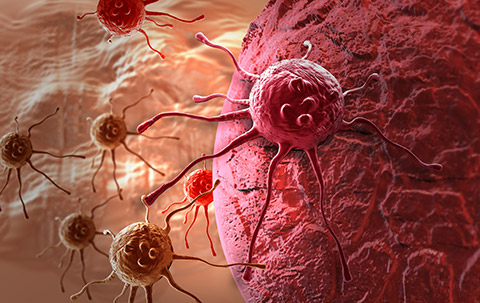Mutations in tumour-halting gene may be useful markers for prognosis
More active forms of gene linked to longer survival of people with cancer
The protein p53, which normally works to stop tumours from forming, is the most frequently altered gene in human cancers, but there is no clarity on how mutations are related to clinical outcomes. Or, there wasn’t.
Dr. Jean Gariépy, a senior scientist in Physical Sciences at Sunnybrook Research Institute, and PhD student Nicholas Fischer are the first to detail a link between p53 mutations and survival in people with cancer. Their research shows that more active mutations of p53 are associated with longer—in some cases by years or decades—survival. The discovery suggests a path by which the gene’s mutation status could help determine prognosis and guide treatment. The study was published in the journal JCI Insight.

Image: Getty Images
Despite p53 long being linked to cancer, results from past studies looking at the link between the gene and outcomes have varied widely, because the mutations were studied as a whole.
Fischer and Gariépy took a different tack by comparing the activity of p53 mutations of more than 2,000 cancer patients. This activity includes regulating genes that repair DNA, for example. They found that people with a p53 mutation that enabled the gene to have even a small amount of activity lived longer than those who had a mutation that made the gene inactive. Of note, men with brain cancer who had a mutation resulting in up to 5% activity of p53 lived 42 months longer than those who had an idle p53 mutation. In stomach cancer, men with a p53 mutation with up to 5% activity lived 38 months, versus 16 months for men who had a mutation leading to an inoperative gene.
Strikingly, they also found that people who are born with p53 mutations in every cell of the body—a disorder called Li-Fraumeni syndrome, which predisposes people to develop cancer—have drastically different lifespans, depending on their mutation. For example, people with Li-Fraumeni syndrome with a mutation resulting in at least 25% activity lived 20 years longer, on average.
The researchers tabulated all clinically known p53 mutations and categorized them by activity. In the future, the hope is that doctors would be able to sequence patients’ tumours and use the table to guide prognosis and treatment, for example, to decide to treat a patient with an idle p53 mutation much more aggressively.



